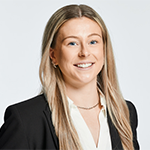Background
From 2018-2022 I completed an integrated master’s degree in Electrical and Electronic Engineering at Cardiff University. In 2022 I joined Abel + Imray in their Cardiff office, as a Trainee Patent Attorney in the Phys/Eng/IT team.
Why did you choose a job in this profession?
I first heard about the profession through a guest lecture from a patent examiner at the UKIPO whilst I was at university. I didn’t know very much about IP generally or patents, but I was drawn to the role because of its unique combination of law, science and language. This combined with the opportunity to work on cutting edge technology was something that excited me.
I also realised during my final year of university that a career in research or based in the lab wasn’t for me, but I wanted to ensure I was still working within the engineering field.
What attracted you to your role?
The opportunity to work on such a range of cutting-edge technology really stood out to me, there aren’t many careers where you can be working on communication systems one day and aircraft the next!
Also, the chance to speak to inventors in different fields of technology, across different countries and hear about what they do is something that I knew I would enjoy and is one of my favourite aspects of the job.
How did you get your job at Abel + Imray?
Once I had heard about the career and knew it was something I would like to pursue, I found a few firms I wanted to apply for. I even sent an email to one of the partners at Abel + Imray who works in the same field as me to express my interest and ask for any tips!
As soon as Abel + Imray advertised a position for a Trainee Patent Attorney, I applied by submitting a CV and covering letter. I then had a Zoom interview followed by an in-person interview a few weeks later.
What was the application process like – any advice?
The interviews were a mix of language-based questions, technical questions, and questions about myself and why I was interested in the profession. I found that when answering the technical questions, it wasn’t so much what you knew, but more how you would approach the problem and apply the information and knowledge you did have. The language-based questions were focused on my understanding and interpretation of words and sentences.
Overall, the process itself was quite straightforward in comparison to what I had experienced in other sectors!
What skills are useful in this profession?
Good communication, literacy and high attention to detail are all key skills for the profession.







